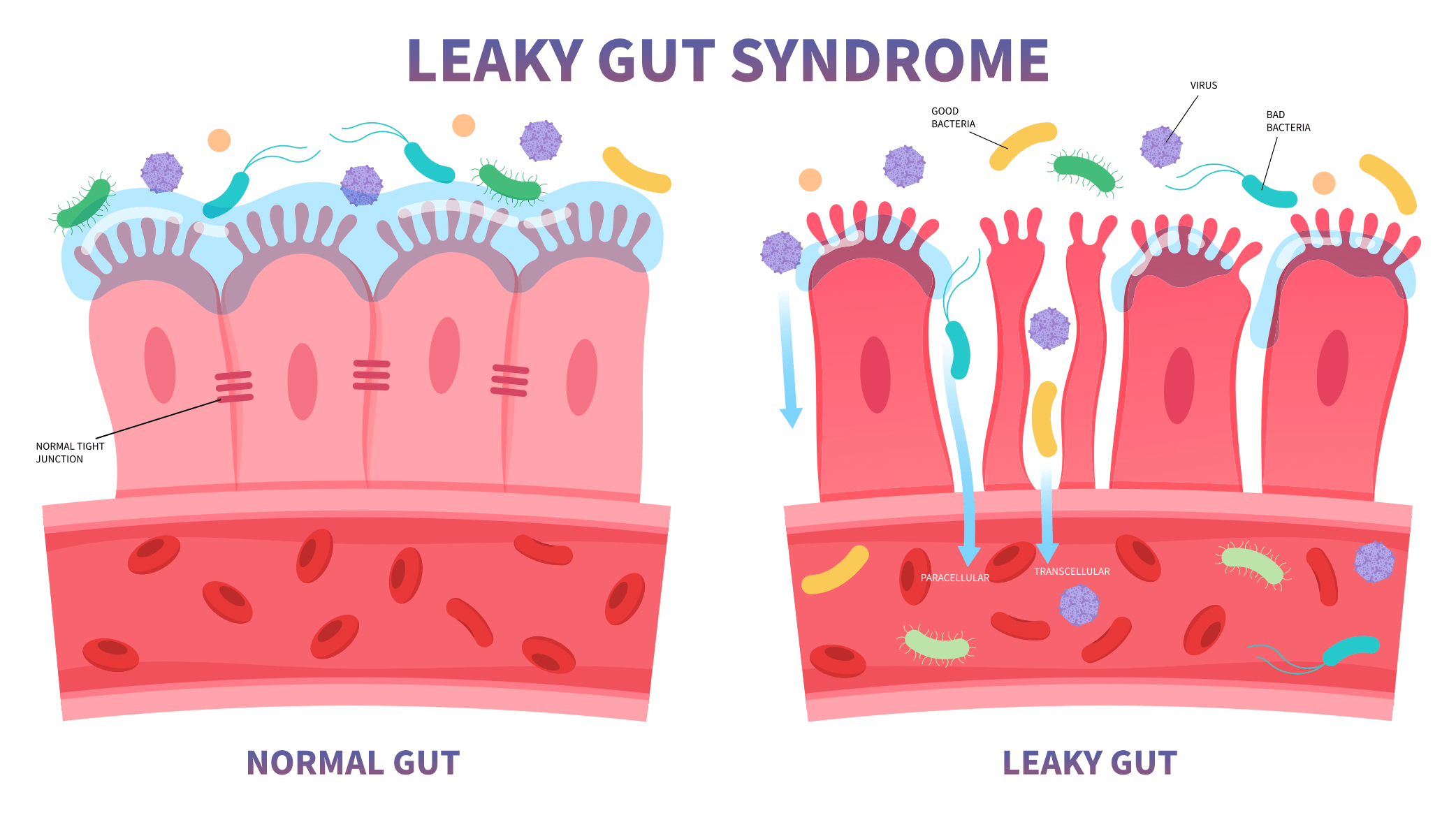Leaky gut syndrome. . .

. . . also known as increased intestinal permeability, occurs when the lining of the small intestine becomes damaged, allowing undigested food particles, toxins, and bacteria to “leak” through the intestinal wall and enter the bloodstream. This can trigger widespread inflammation and an immune response. Several factors can contribute to the development of leaky gut:
1. Poor Diet
- Processed Foods: Diets high in refined sugars, processed foods, and unhealthy fats can damage the gut lining.
- Gluten: Some individuals may have a sensitivity to gluten, a protein found in wheat, barley, and rye, which can contribute to intestinal permeability.
- Alcohol: Excessive alcohol consumption can irritate and damage the intestinal lining.
2. Chronic Stress
- Prolonged stress can disrupt the balance of gut bacteria and compromise the integrity of the gut lining.
3. Infections
- Bacterial, viral, or fungal infections can cause inflammation and damage to the gut lining.
- Overgrowth of harmful bacteria (dysbiosis) can also disrupt the balance of the gut microbiome and contribute to leaky gut.
4. Medications
- Nonsteroidal Anti-Inflammatory Drugs (NSAIDs): Prolonged use of NSAIDs like ibuprofen and aspirin can damage the intestinal lining.
- Antibiotics: Overuse of antibiotics can disrupt the balance of gut bacteria, leading to dysbiosis and increased intestinal permeability.
5. Toxins
- Exposure to environmental toxins, such as pesticides, heavy metals, and certain chemicals, can damage the gut lining.
6. Food Sensitivities and Allergies
- Chronic exposure to foods that an individual is sensitive or allergic to can cause ongoing inflammation and damage to the gut lining.
7. Nutrient Deficiencies
- Deficiencies in certain nutrients, such as zinc, vitamin D, and omega-3 fatty acids, can impair the body’s ability to maintain the integrity of the gut lining.
8. Autoimmune Conditions
- Conditions like celiac disease, Crohn’s disease, and other autoimmune disorders can cause inflammation and damage to the gut lining, contributing to leaky gut.
9. Lifestyle Factors
- Lack of sleep and physical inactivity can negatively impact gut health and contribute to increased intestinal permeability.
Managing and Healing Leaky Gut
- Dietary Changes:
- Adopt an anti-inflammatory diet rich in whole foods, including fruits, vegetables, lean proteins, and healthy fats.
- Avoid processed foods, refined sugars, and food additives.
- Eliminate foods that trigger sensitivities or allergies.
- Probiotics and Prebiotics:
- Probiotics can help restore the balance of gut bacteria. Foods like yogurt, kefir, sauerkraut, and kimchi are good sources.
- Prebiotics, such as fiber-rich foods, feed beneficial gut bacteria.
- Nutrient Support:
- Ensure adequate intake of key nutrients that support gut health, including zinc, vitamin D, and omega-3 fatty acids.
- Bone broth and collagen supplements can help support the integrity of the gut lining.
- Stress Management:
- Practice stress-reducing activities such as mindfulness, meditation, yoga, and regular exercise.
- Avoiding Toxins:
- Minimize exposure to environmental toxins by choosing organic foods, using natural cleaning products, and avoiding unnecessary medications when possible.
- Proper Sleep and Exercise:
- Ensure adequate sleep and incorporate regular physical activity into your routine to support overall gut health.
Addressing the root causes of leaky gut through lifestyle and dietary changes can help repair and maintain a healthy gut lining.




